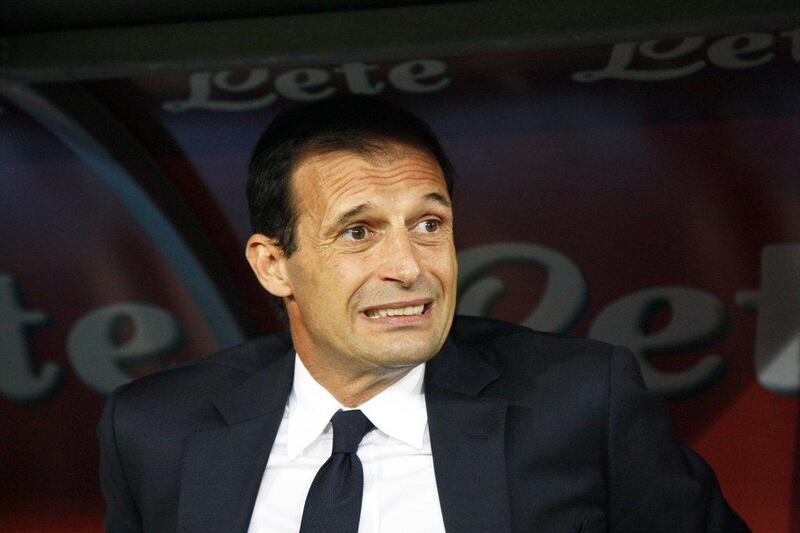A little over five months ago, Juventus contested the Uefa Champions League final, and lost it, narrowly, to Barcelona. Consolation lay in the two other major Italian trophies they accumulated that season. The gathering of prizes has become habitual lately for Juve. Onwards, they thought, and upwards.
A little under two months ago, Sevilla contested a Uefa Super Cup final, and lost it, narrowly, to Barcelona. Consolation lay in the two major European trophies they accumulated in the preceding 18 months. The gathering of prizes has become a habit for the Spanish club. Onwards, they thought, and upwards.
Take a glance at the Group D table of the Champions League, and, logically enough, last season's runners-up in the competition and the serial winners of the Europa League – Sevilla seized it in 2014 and 2015 – occupy the top two places. They meet in Turin on Wednesday hoping to at least keep Manchester City, who play Borussia Monchengladbach in the other pool match, beneath them.
But now look at their domestic league tables. And best start reading up from the bottom. In Serie A, Juventus, the Italian champions, have a mere five points from their six matches so far, just a single win, and are two points off the relegation zone. In La Liga, Sevilla are practically their copycats: five points from six; just the one victory, two places off relegation territory.
There are parallel diagnoses that can be applied to both clubs, and their struggles. Both said goodbye to an expert striker in the summer; Carlos Tevez left Juve for Boca Juniors, and Carlos Bacca joined AC Milan from Sevilla. That pair had been their teams’ leading goalscorers in 2014/15. A strong pulse of energy seems to have departed the Juve and Sevilla midfields, too. Juve sold their Vidal, Arturo, to Bayern Munich and with it lost some of his drive and bite; Sevilla sold their Vidal, Aleix, to Barcelona, where, because of the buying club’s ban on registering new players until 2016, he is still waiting to apply his drive and skill to Barca’s right flank.
Given those departures, plus Juve’s farewell to Andrea Pirlo, and Sevilla’s to the strong, experienced Stephane Mbia, a period of adaptation was always likely to be necessary, although neither of the respective coaches, Max Allegri and Unai Emery, would have anticipated the teething troubles of fitting in new players in positions which had been expertly manned before being quite this taxing. Allegri and Emery have each hinted that a resilience, a defiance that used to propel their teams is missing.
Some of Allegri’s frustrations were visible in one moment during the 2-1 Champions League victory against Manchester City this month, a lone high in a campaign that has included defeats against Udinese and AS Roma and a gloomy draw against Serie A newcomers Frosinone. Juventus were not on top at the point Allegri, in his technical area, watched Juan Cuadrado, the Colombian winger on loan at Juve from Chelsea, lost possession and then dally in his effort to retrieve it. Cuadrado’s misfortune was to do that on the flank next to where Allegri was standing, then suddenly bellowing at the player, and so livid with Cuadrado it looked as if the coach, who normally has such an urbane manner, might physically haul him from the pitch.
Cuadrado had lacked a Tevez-like, or Vidalesque gumption in that moment. He may yet become a footballer who gives Juve something more than they had last season, some zip and extra width. But there is insufficient evidence as yet.
Equally it may be that Sevillistas come to view Yevgeny Konoplyanka, also a gifted winger but not famed for his work rate, and signed in the transfer window from Dnipro of Ukraine, as an upgrade on some of their departed players. But he too is suffering a little from a beleaguered coach’s exasperation that last season’s squad belligerence and industry have evaporated.
“Konoplyanka has qualities, but still needs to adapt,” said Emery after the Ukrainian, so far used only from the bench, scored his third goal since arriving. He may just get more minutes tonight, as Sevilla try to take advantage of the reality that the Juventus Stadium seems much less of a fortress than it did last season.
sports@thenational.ae
Follow us on Twitter @NatSportUAE






